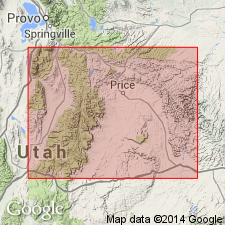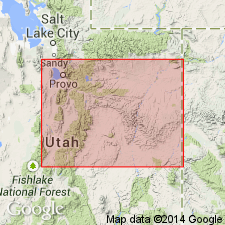
- Usage in publication:
-
- Funk Valley formation*
- Modifications:
-
- Named
- Dominant lithology:
-
- Sandstone
- Shale
- AAPG geologic province:
-
- Wasatch uplift
Summary:
Named as a formation (one of four) in the Indianola group (new) for Funk Valley, Sanpete Co, UT, Wasatch uplift. Type locality is on ridges bordering Funk Valley in secs 34 and 35, T18S, R2E, 3 to 4 mi southwest of Manti. Is exposed more extensively than the other formations of the group. Forms the marginal foothills of the Wasatch Plateau for more than 4 mi south of Crystal Spring. Overlies the newly named Allen Valley shale of the Indianola. Underlies the newly named Sixmile Canyon Formation of the Indianola. Divisible into three members at the type. The basal member consists of sandstone interbedded with shale about 900 ft thick. The middle member consists of gray marine shale 650 ft thick. The upper member consists of sandstone 700 ft thick. Sandstone ranges in color from white through cream and buff to brown. Fossils found in the two sandstone members indicate equivalence to part of Mancos shale above the Ferron sandstone member. May be equivalent to the Coalville and Evanston formations. Of Niobrara, Late Cretaceous age. Stratigraphic table.
Source: GNU records (USGS DDS-6; Denver GNULEX).

- Usage in publication:
-
- Funk Valley Formation*
- Modifications:
-
- Age modified
- Overview
- AAPG geologic province:
-
- Wasatch uplift
Summary:
Is of late Turonian, Coniacian, and early Santonian age. Ostracods and foraminifers identified in sec 20, T9S, R5E, Utah Co, UT on the Wasatch uplift.
Source: GNU records (USGS DDS-6; Denver GNULEX).
For more information, please contact Nancy Stamm, Geologic Names Committee Secretary.
Asterisk (*) indicates published by U.S. Geological Survey authors.
"No current usage" (†) implies that a name has been abandoned or has fallen into disuse. Former usage and, if known, replacement name given in parentheses ( ).
Slash (/) indicates name conflicts with nomenclatural guidelines (CSN, 1933; ACSN, 1961, 1970; NACSN, 1983, 2005, 2021). May be explained within brackets ([ ]).

